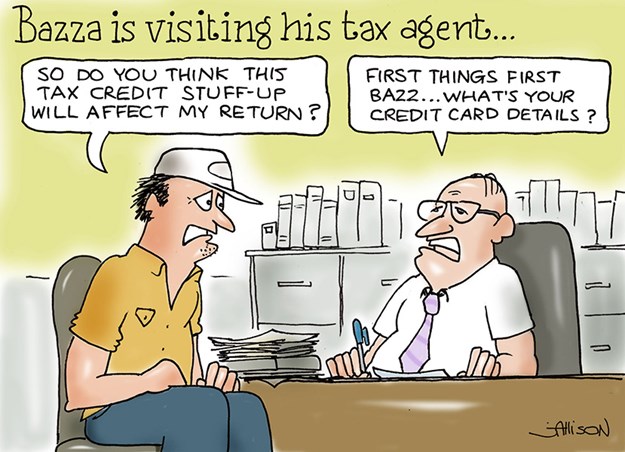The Australian Tax Office has revealed its most dobbed-in industries for tax avoidance with road freight transport one of the worst offenders
Demanding cash from customers, paying workers ‘cash in hand’, or not declaring all sales are the most common examples of the 43,000 tip-offs received by the Australian Taxation Office (ATO) in the 2021-22 financial year.
The ATO says it is using intelligence from tip-offs as part of its approach to dealing with the shadow economy.
The ATO explains that the shadow economy (previously referred to as the black economy) refers to activities that take place outside of the tax and other regulatory systems. The ATO estimates that the community misses out on around $11 billion in taxes each year as a result of the shadow economy.
Road freight transport was among those industries topping the tip-off list during the past year. Other industries included building and construction, hairdressing and beauty services, cafés and restaurants, and management advice and related consulting services.
Tip-offs from New South Wales topped the ATO’s list with over 13,400, followed closely by Victoria (over 11,500) and Queensland (over 9,200).
ATO assistant commissioner Peter Holt explains that tip-offs helped the ATO shine a light on tax avoidance and protect honest businesses.
“We received 727 tip-offs about the road freight transport industry during the 2021-2022 financial year,” Holt says.
He specifically mentions one tip-off from a former employee of a road freight business.
“This individual reported that he and several other drivers were receiving cash wages. He was concerned that this was being done to avoid the company’s tax and superannuation obligations.
“He stated that he had not been paid his superannuation since he started working for the company,” Holt says.
“Evidence provided by the employee also showed that his former employer was charging GST even though the business was not registered for it.”
Holt clarifies that it’s not just businesses the ATO has its eye on. “We know that many customers also demand to pay in cash and ask for discounts to avoid paying tax, and we also know that many workers are demanding cash especially where there is a shortage of labour. Our message is – regardless of which party is driving the behaviour – it’s illegal and we’re on to it.”
Holt says the last couple of years have been tough for some businesses. “But this doesn’t make it okay to gain an unfair advantage over honest businesses playing by the rules,” he adds.
“The shadow economy is an economic and social issue that affects all of us. As businesses recover from the impacts of COVID and natural disasters it is more important than ever to protect the vast majority of businesses who are honest and try to do the right thing.
“Every dollar of tax dodged is a dollar that can’t be used for vital services like health and aged care. We’ve all witnessed over the past couple of years how much the community relies on these critical services,” he says.
Holt adds that tip-offs from the community provide the ATO with valuable intelligence to assist with current and future investigations, with more than 90 per cent of the 43,000 tip-offs received found suitable for further investigation or retained for intelligence purposes. “Sometimes that tip-off can be the final piece of the puzzle we need to act.
“We get tip-offs from other businesses, customers, members of the public, even employees. The surge in tip-offs tells us the community is not willing to let this behaviour slide anymore. If these businesses think they can continue to hide in the shadows and not pay their fair share of tax, they are mistaken. It’s not a matter of if the ATO will shine a light on this behaviour, it’s when.”
Holt confirms that most of the tip-offs came in from Sydney with over 5,600 received. “But the tip-offs aren’t just coming in from the big cities. We also got almost 7,000 tip-offs about shady behaviour from people outside of capital cities last financial year.”
RELATED ARTICLE: ALRTA takes a swipe at government over fuel excise
The top five regional locations that the ATO received tip-offs from in 2021-22 were the Sunshine Coast hinterland and Cairns in Queensland, Wellington (NSW), Wodonga (Victoria) and the Mornington Peninsula.
Holt says tell-tale signs that a business may be operating in the shadow economy include ‘cash only’ signs, offering a discount for cash, not accepting card payments, failing to provide payslips to workers, not ringing up sales, or even running illegal software that deletes or modifies sales transactions.
Holt also encourages tax professionals to look out for shadow economy behaviour. “We’re asking tax professionals to dig deeper and ask their clients more questions when things don’t add up. When reported income falls outside of our small business benchmarks, this should be a warning sign to tax professionals that they need to ask more questions as there could be some shadow economy behaviour at play.”
The ATO also confirmed it has received a number of tip-offs as part of Operation Protego, which is investigating significant fraud involving participants inventing fake businesses to claim false refunds.
Tip-offs can be made online at ato.gov.au/TipOff, via the ATO app, or by phoning 1800 060 062.



